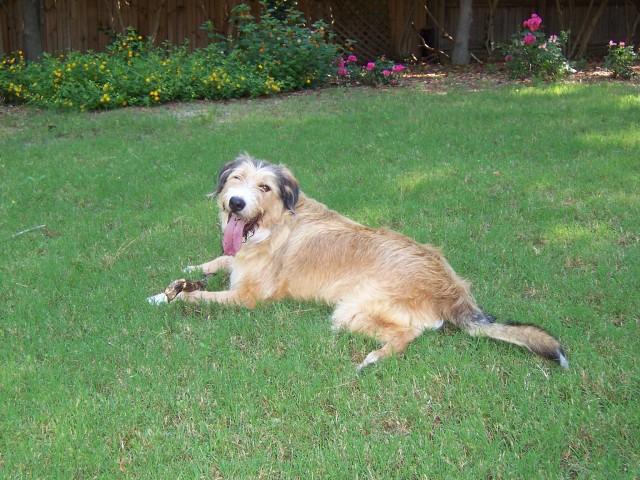QuestionShe is 2 years old, was adopted from a family as a puppy who had several other dogs. Is extremely attached to her male owner who trys to take her everywhere he goes and he works mostly from home. I take care of her the few times he has to leave town. Dog is absolute sweetheart but worships her master. The minute he leaves her site she starts chasing her tail, within a few minutes she starts chewing the hair off. As of right now she is on meds (just started). When I have her in my care and have to leave her alone for short periods she will do this also but when I am gone I put a plastic "cone" on her to prevent the chewing. I would love to find some help for her.
When she chews the hair off it is nearly to the skin. A veterinarian had told the owner that you can always "bob" the tail if it became too bad or she started chewing the skin. My fear would be that she would fixate on another body part to destroy.
THank you for any advice you can give.
AnswerThis isn't your dog so you have no control over what happens to her, although your concern is greatly appreciated by me (and the dog, I have no doubt).
Do you know if the dog exhibits this behavior when WITH the owner - have you ever questioned him about this?
I have no idea what sort of "meds" she's on. SSRIs have the high possibility of making this behavior worse (since they can, and sometimes do, cause heightened anxiety in humans, who can at least report it). There are medications that target OCD. Tail chasing can be a sign of low level epilepsy (and yes, stress can exacerbate this), response to pain (orthopedic, spinal, intestinal). If the veterinarian who gave this advice is the one who prescribed these "meds", the dog should NOT BE ON THEM. He's an idiot.
The dog requires comprehensive examination by a veterinary behaviorist. This will entail base line neurological exam, orthopedic evaluation, comprehensive blood work, possible ultrasound or body x-ray, etc., as well as full medical history (is dog on topical flea and tick prevention? If so, this could be contributing). The owner must, obviously, be willing to meet the expense.
To find such a professional, contact the veterinary college in your geographical area or see the following sites:
http://www.veterinarybehaviorists.org/
http://www.avsabonline.org/avsabonline/
Putting a cone on her when you are unable to observe is an excellent stop gap measure for the short term. IF you SEE HER begin this behavior in front of you, put her on leash and merely sit with her on restraint for a few minutes: do not make eye contact, say nothing, do nothing. Leash restraint often engages cognition in a manner that stops even low level seizure behavior. Redirecting her to a well trained (with positive reinforcement) behavior might help the dog (over time, perhaps months) to "learn" a new reaction to whatever drive is engaged in this behavior, providing it is not of biologic origin.

 Dog light and shadow chasing
Question
Jenni
My 3 year old Cavalier King Charles Span
Dog light and shadow chasing
Question
Jenni
My 3 year old Cavalier King Charles Span
 uncontrollable beagle
Question
max
My beagle is a year and a half. Ive had hi
uncontrollable beagle
Question
max
My beagle is a year and a half. Ive had hi
 anxious dog
Question
Louie
Hi, We adopted a 2 year old male A
anxious dog
Question
Louie
Hi, We adopted a 2 year old male A
 licking the floor not stop
QuestionGeorgie
QUESTION: Hi,
I have a 7 year ol
licking the floor not stop
QuestionGeorgie
QUESTION: Hi,
I have a 7 year ol
 Agressive 1 yr old mini goldendoodle
Question
our millie
My husband and I got our min
Agressive 1 yr old mini goldendoodle
Question
our millie
My husband and I got our min